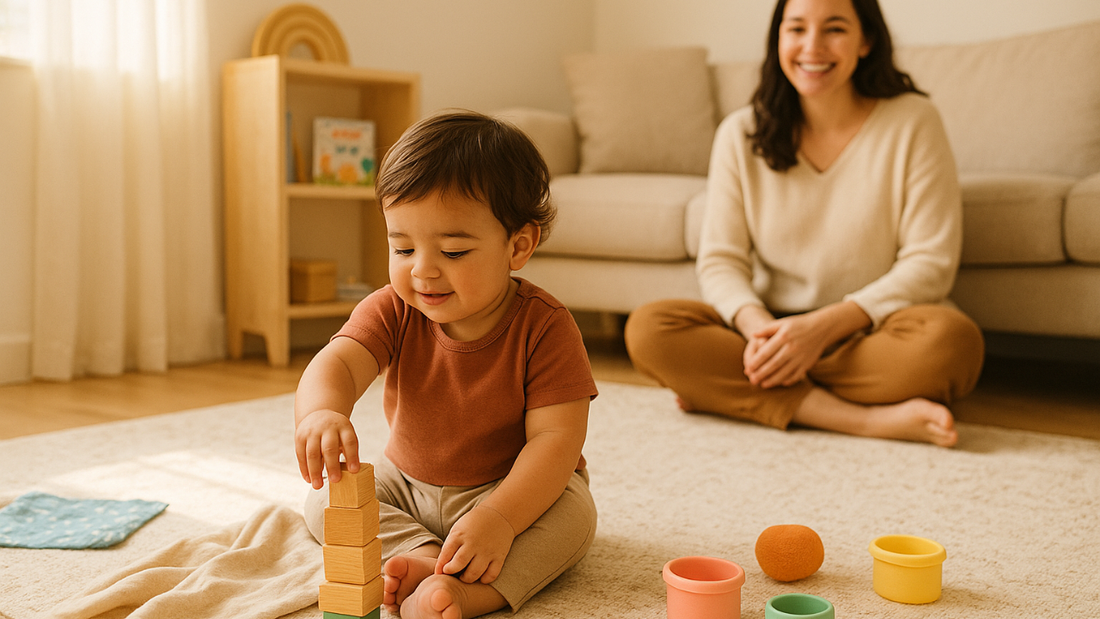
Independent Play: How (and When) to Foster It
LiLLBUDIt can feel like a small victory to watch your child play by themselves, and it's more than just a moment of peace for you. Toddlers can learn, grow, and explore on their own terms through independent play. Fostering moments of solo play lays the foundation for creativity, confidence, and problem-solving skills that last a lifetime, whether your child is just starting to walk or is already speaking in short sentences.
The Importance of Independent Play
Playtime alone isn't just a way for parents to take a break; it's an important part of how kids grow. Toddlers learn through playing alone:
- Help them use their curiosity and imagination
- Learn how to solve problems
- Learn how to control your emotions
- Get more self-assurance and freedom
When to Encourage Independent Play
Every child is different, and timing is important:
- 6 to 12 months: Short periods of independent play with close supervision. While you watch, let babies feel different textures, shake things, or play with safe things around the house.
- 12–18 months: Toddlers can pay attention for 5–10 minutes on their own while doing simple things like stacking cups, pouring, or playing pretend.
- 18 to 24 months and up: Attention span gets longer. They can play by themselves for 15 to 20 minutes, doing things like building or using their imagination.
Tip: Start with short sessions and slowly add more time. Even small steps can help you become more independent and confident.
How to Foster Independent Play Beyond Toys
You don't need a lot of things to let your child play on their own. Here are some simple, everyday ways to do it:
- Be creative with everyday things. Wooden spoons, pots, cups, scarves, or cardboard boxes can get your imagination going. Encourage young children to play with stacking, cause-and-effect, or pretend situations.
- Start with open-ended activities: Making drawings, building towers, or doing simple chores around the house, like pouring water or sorting laundry. The point is to let your toddler try things out and learn.
- Balance Presence and Distance: Find the right balance between being there and being far away. If you want to feel better, sit nearby and read or work quietly. Slowly back off and let them explore on their own, only checking in if you need to.
- Encourage Problem-Solving: Encourage times when people can solve problems. Don't give in to the urge to fix every little problem. Let toddlers work on puzzles, stacking challenges, or make-believe situations. They will learn how to be strong and think critically.
- Create Routines: Make routines that are easy to follow. Set aside time each day for "independent play."Routine makes toddlers feel safe and helps them look forward to and enjoy playing alone.
Tips for Success
- A small start is key. Try setting aside just five minutes. Even that little bit makes a difference and will expand later.
- Always cheer on their curiosity. Praise the effort and the desire to try new things. Focus on how inventive they are, not the finished project.
- Balance social interaction: It's important for kids to play alone, but they should also have playdates, read, and do things with their families.
- Model focus: Kids often copy calm, focused behavior. Demonstrate that independent involvement is beneficial.
Common Mistakes
- Expecting too much too soon, people's attention spans grow over time.
- Constantly stepping in can make people less interested.
- Limiting independence to toys is not good; everyday exploration is just as important.
Independent play is not about leaving your child all alone. It is more about guiding them towards becoming more independent, sparking their creativity, and boosting their confidence. You are helping your toddler develop skills that last a lifetime. By providing safe, interesting opportunities, stepping back gradually, and celebrating their exploration.
A little self-reflection for parents: What tiny moments in our daily routine could turn into chances for independent play? And how can I watch without jumping in too quickly?
Independent play can truly become a fun and enriching part of your toddler's day. Just with a bit of patience, consistency, and encouragement

